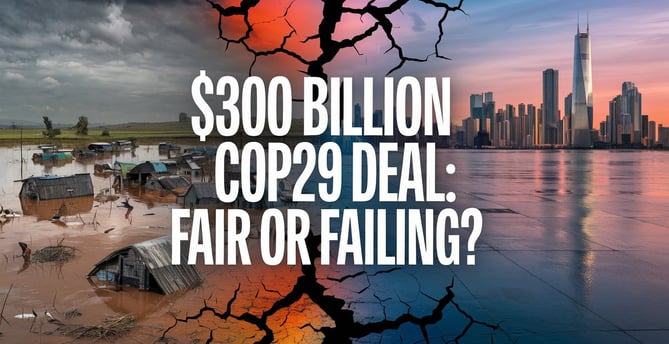Developing Nations Criticize $300 Billion COP29 Climate Deal
Developing nations have criticized the $300 billion COP29 climate deal, arguing it fails to address their urgent needs for loss and damage funding, adaptation support, and equitable priorities. While aimed at tackling global climate change, the deal highlights the ongoing divide between wealthier and vulnerable nations in addressing climate challenges.
FINANCE
beingMJ
11/28/20242 min read


The $300 billion climate deal announced at COP29 has faced backlash from developing nations 🌱. Many leaders argue that the agreement does not adequately address their needs, leaving them vulnerable to the worsening effects of climate change 🌊🔥.
While the deal aims to combat global warming and support recovery efforts, developing countries feel that the benefits are skewed toward wealthier nations 💰.
🌐 What is the COP29 Climate Deal?
The COP29 summit brought together representatives from nearly 200 countries to tackle climate change. The $300 billion deal was meant to:
Reduce global carbon emissions 📉.
Help nations adapt to climate impacts 🏗️.
Fund recovery efforts for loss and damage caused by climate disasters 💔.
However, developing nations argue that the deal falls short in addressing their unique challenges.
❓ Why Are Developing Nations Dissatisfied?
Leaders from these nations have highlighted several key issues:
1. Inadequate Funding for Loss and Damage 💸
Climate change has caused devastating disasters, such as hurricanes, droughts, and rising sea levels 🌪️🌊. Developing countries, often the hardest hit, need financial support to rebuild homes, infrastructure, and livelihoods.
Although the deal includes some funding, leaders say it’s not enough to cover the increasing scale of these disasters. They feel they are left to shoulder the burden alone.
2. Limited Support for Adaptation 🛠️
Adapting to climate change—such as building resilient infrastructure, improving agriculture, and managing water resources—is expensive 💧🌾. Wealthier nations can afford such investments, but poorer nations often rely on international aid.
The COP29 deal promises adaptation funding, but critics argue there is no clear plan for how this money will reach those who need it most 🤷♂️.
3. Unfair Priorities ⚖️
Developing nations contribute the least to global greenhouse gas emissions but suffer the most severe consequences 🌍💔. Yet, they feel their concerns are sidelined in favor of wealthier countries’ priorities, such as emission reductions that do little to address immediate crises.
🕊️ A History of Broken Promises
This isn’t the first time developing nations have felt let down. In 2009, wealthier nations pledged $100 billion annually to help vulnerable countries fight climate change 🌱. However, this target has not been fully met, leading to mistrust and frustration 😤.
The $300 billion COP29 deal, while larger in scale, is seen as another unfulfilled promise. Many developing nations fear it will remain more talk than action.
🌱 What Do Developing Nations Want?
Leaders from these countries have outlined what they need for the fight against climate change to be fair:
More Funding for Loss and Damage 💵: Substantial, predictable financial aid to help communities recover after disasters.
Accountability ✅: Clear systems to ensure wealthy nations deliver on their promises.
Focus on Vulnerable Communities 🤝: Prioritizing those most at risk from climate impacts, like small island nations and rural populations.
Acknowledgment of Responsibility 🏛️: Wealthy nations, having contributed most to historical emissions, must take greater responsibility for funding global solutions.
🌍 Moving Forward
The COP29 climate deal highlights the ongoing divide between nations in addressing climate change. For global progress, fairness must be at the heart of these agreements ❤️.
Developing nations are already on the frontlines of climate disasters 🌊🔥. Without adequate support, they cannot adapt, recover, or contribute meaningfully to global climate goals 🌱.
Wealthier countries must listen to their concerns and ensure future agreements address their needs equitably. This isn’t just about doing what’s right—it’s essential for ensuring a sustainable future for everyone 🌏.
🌟 Final Thoughts
The world’s efforts to tackle climate change depend on unity and trust 🤝. For developing nations, promises made at summits like COP29 must translate into meaningful action.
Let’s hope that future climate deals prioritize the needs of the most vulnerable and pave the way for a fairer, greener world 🌿🌍.
Contact Us :
beingaimj@gmail.com
© 2024. All rights reserved.
